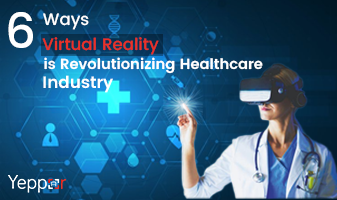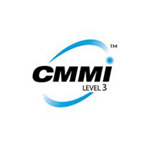The popularity of Virtual Reality in healthcare is rising. The technology that was once associated with gaming and entertainment is now rapidly being adopted by various industries. Healthcare is one of the most prominent sectors utilizing VR technology smartly and swiftly.
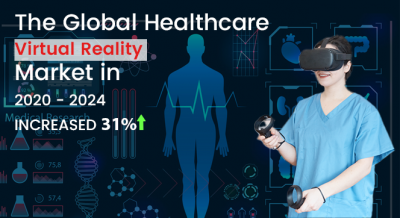
The global healthcare Virtual Reality market in 2020 was estimated at $337 million. Since the pandemic hit, it has increased at a CAGR of nearly 31%. Moreover, it’s expected to be a $2.2 billion industry by 2024. There is immense scope for VR technology in healthcare. It’s one of the top three adopters of this immersive technology. The industry utilizes simulated solutions in all verticals, from robotic surgery to surgery simulation, phobia treatment, skill training, diagnosis, pain management, research and development, medical assistance, and more.
Here are the significant applications of VR in Healthcare
Medical Education
Virtual Reality and education are a match made in heaven, taking learning and knowledge enhancement to the next level. It’s been a while since VR has been used in medical education and training.
Interactive content, 360-degree view, risk-free simulated virtual environment, and other immersive components let students learn faster and better. They practice complex procedures and improve their life-saving skills before moving to a real environment.
Yeppar provides custom VR learning modules for medical and nursing students. Trainees can use such real-like alternates to experience practical use cases and improve their cognitive skills.
Assisted Surgery
The word sounds shivering. However, advanced virtual reality tools and applications are helping neurosurgeons, dentists, and thoracic surgeons better perform complex surgeries. It has been revealed in a study by Harvard Business Review that VR training improves participants’ overall surgical performance by 230%.
George Washington University is also using an advanced virtual reality tool to enable surgeons virtually explore a patient’s situation before performing the procedure.
As technology grows, advanced solutions are improving efficiency and awareness. It’s also enabling trainee surgeons to quickly adopt the complexities and improve performance before assisting senior doctors in a real environment.
Along with immense practice opportunities, the solutions also save money and time. Hospitals can act fast in emergencies, coordinate with experts, and save lives.
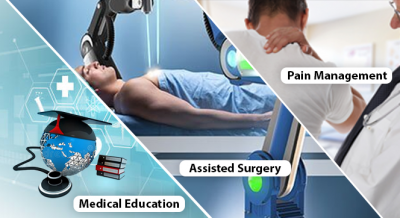
Pain Management
VR has proved to be an effective cognitive distraction method in treating or diminishing different types of pain. Studies show that VR experience reduces pain by 24%. Hospitals use it for women in labor, sick or injured children, patients suffering from chronic or acute pain, and more. Physicians aren’t required pharmaceutical therapies in a simulated environment that distracts patients.
VR solutions provide an escape into the immersive world where patients can tour their favorite places, enjoy simulated games, interact with other people through avatars, and experience emotions such as happiness, enthusiasm, curiosity, and more. This also improves their healing ability.
A study from the University of Washington founds that VR engagement significantly reduces the intensity of feeling the pain. Thus, Virtual Reality works as a drug-free therapy.
Rehabilitation and Fitness
A therapy session turned into a gamified experience is a tremendous driving force for patients to perform better. It has been found that immersive experiences have motivated patients to strive for better results.
Healthcare workers can use custom VR apps for neurological rehabilitation and cognitive and physical therapies. Patients can use these specialized programs to experience and practice real-life skills such as shopping or cleaning clothes.
Patients with cerebral palsy can also benefit from the immersive environment that simulates senses for improved motor functions.
The fitness industry can also take advantage of these technologies. Combining cardio routines with Virtual Reality is rapidly transforming the way we exercise.
Mental Health
VR can be used to address multiple psychiatric ailments. It is proven to be a safe, effective, and affordable solution to treat phobias, depression, anxiety, panic attacks, and traumatic disorders. Many studies have verified the effectiveness of virtual Reality in conjunction with counseling for treating addictions.
Psychologists have effectively treated traumatic patients using VR tools. It is also proving helpful for autistic adults and children. A simulated environment is safe for them to learn cognitive behavior and develop necessary skills such as walking on a street, waiting in a queue, or working in the kitchen.
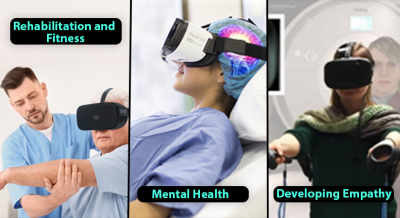
Developing Empathy
It is challenging to feel someone’s pain unless we put our feet in their shoes. Experiencing pain improves empathy and helps physicians better connect with patients. It is more crucial when dealing with elderly patients, people who have dementia, Parkinson’s disease, cerebral issues, and more.
VR tools help doctors develop empathy as they experience these in virtual space. Studies have shown that medical students who use VR tools better understand age-related health issues. The technology is successfully enhancing human simulations through immersive experiences.
Conclusion
The applications of virtual Reality in medical and healthcare are immense. With technology advancements, the possibilities of introducing new VR tools in the healthcare sector are increasing rapidly. The compound annual growth rate of 30.3% shows how smoothly, and swiftly virtual Reality spreads across all life sciences, pharmaceuticals, medical and healthcare verticals. Yeppar continuously develops scalable and value-driven solutions for the healthcare industry by contributing its share of technology advancements to upscale procedures and training. Want to know more about how we can help you? Contact us.





